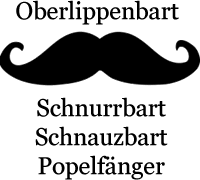
I came across the wonderful German word Schnurrbart [ˈʃnʊrba:ɐ̯t] recently and just liked the sound of it. The Bart part means beard – you can see the connection – and the Schnurr part comes from schnurren (to purr).
According to Wikipedia: “Ein Schnurrbart ist ein über der Oberlippe wachsender Bart.” or “A moustache is an beard growing over the lip”, and it is also referred to as an Oberlippenbart (overlipbeard). A large moustache is called a Schnauzbart (Schnauze = lip, muzzle, snout).
Other words used for moustache in German include Bürste (brush), Schnauzer (a type of dog), Schnorres, Schnorrati, Sör, Rotzbremse (“snot brake”) and Popelfänger (“bogie catcher”). Do you know/use any others?
Other words for moustache in English include tache/tash, whiskers, face fungus, tea/soup strainer, snot catcher/mop, lip rug, and crumb catcher.
The English word moustache comes from French, from the Neapolitan word mustaccio.
Do moustaches have interesting names or nicknames in other languages?
Sources: bab.La dictionary, PONS dictionary, Wikipedia, howtogrowamoustache.com, OED
